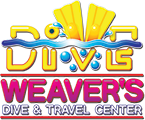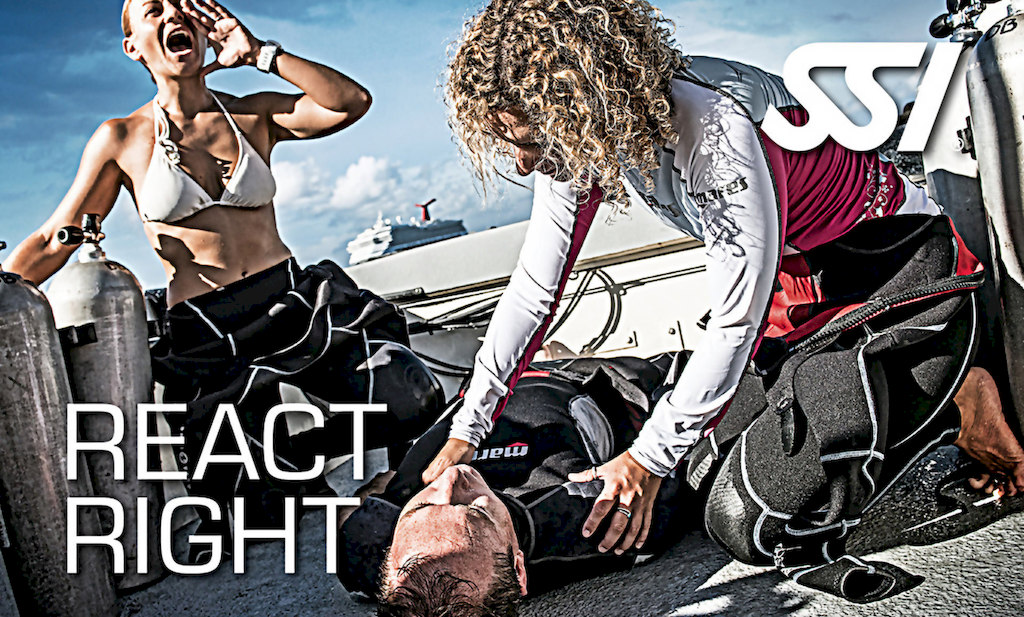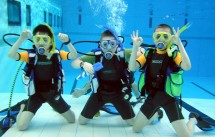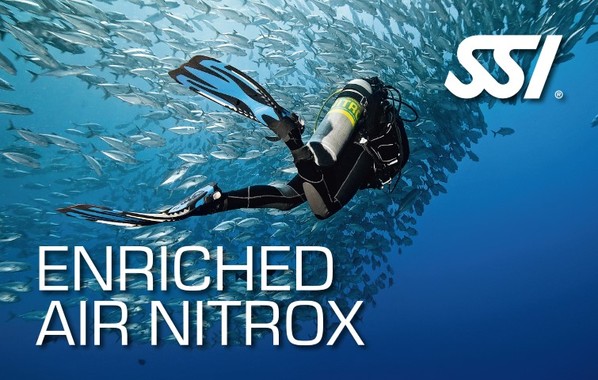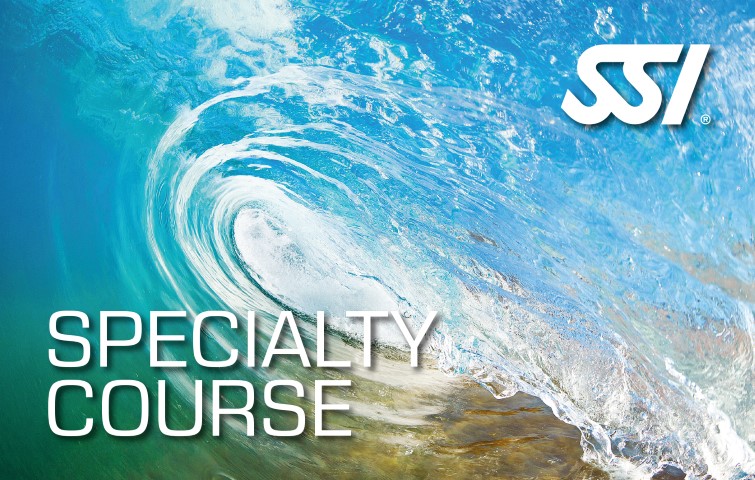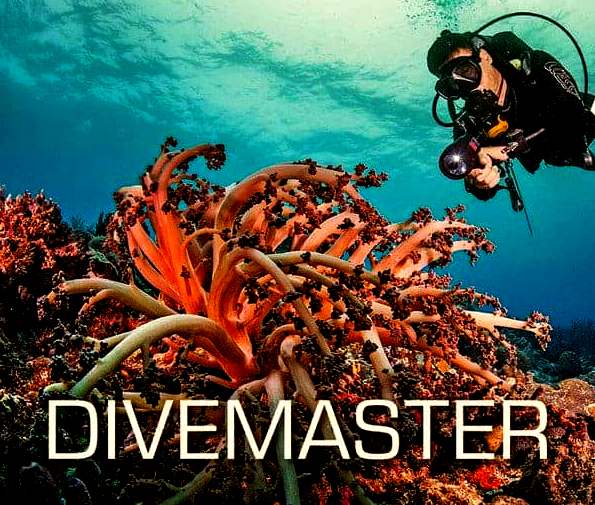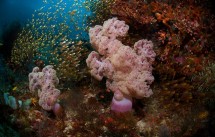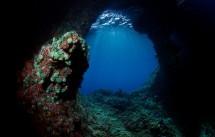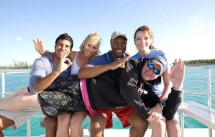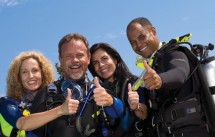The Weaver’s “ART” program is designed for divers who are looking to extend their skills beyond the basics of open water scuba diving. It is ideal for two kinds of divers:
- Those that want to extend their recreational dive skills to the maximum, so that they can safely and enjoyably dive to the very limits of recreational diving, enjoying greater depth and basic overhead environments in comfort and safety.
- Those who want to take their diving beyond recreational limits to enjoy all aspects of the underwater world, including decompression diving and more serious and challenging overhead environments.
Advanced Recreational Classes
The following all lead to PADI specialty certifications.
TecReational Diver: This is the class that will transform the diving of almost all recreational divers. It includes academic lessons on gas management, team diving, and decompression theory, but its primary emphasis is on teaching advanced buoyancy skills and finning techniques. Students learn to maneuver in challenging environments without disturbing silt or damaging their surroundings. Key skills include advanced buoyancy and trim, frog kick, modified frog kick, modified flutter kick, back water kick, helicopter turn, and marker buoy deployment. This class is a Weaver’s exclusive—it is offered nowhere else in Colorado.
COURSE COST: $450.00
Advanced Dive Planning: This is a comprehensive course that includes academic training in dive theory, gas planning, dive strategies, safety techniques that include deployment of surface marker buoys, and a variety of other topics that complete diver training for planning and executing dives in all environments. Divers who complete this course should feel confident in planning and executing safe and enjoyable dives almost anywhere in the world without the without the need for professional supervision. This class is a Weaver’s exclusive—it is offered nowhere else in Colorado.
COURSE COST: $350.00
Deep Diver: This course teaches divers to go to the limits of recreational diving depths with safety and confidence. Divers learn to plan deep dives so that they know they will have enough time and breathing gas to accomplish their goals. They learn key safety techniques needed for deep diving.
Cavern Diver: The PADI cavern diving specialty teaches the basics of cave diving within the limitations of the cavern zone—the entry area of a cave that extends as far as light is visible from the opening. Weaver’s is one of only a few shops in Colorado that offering this certification.
Wreck Diving: The PADI wreck diving specialty is an introduction to more advanced wreck diving, showing how divers can safely explore wrecks within recreational diving limitations.
Dry Suit Diver: Many more advanced recreational and most technical divers use dry suits rather than wet suits when diving in cooler waters. Divers planning to take technical diving training in the future are strongly advised to take this class and gain experience in dry suits before starting technical dive training.
Custom Training: Is there something specific you want to work on or learn without going through an entire course? Would you like a professional to analyze your current diving skills and equipment and help you move to a higher level based on that analysis of what you need? If so, a custom training workshop is what you need. Individualized sessions can be set up for you or for a small group of friends. Depending upon your needs, this can be done in a pool or in open water.
Technical Diving
Technical Diving is loosely defined as any diving that takes the diver beyond recreational limits. One way of describing it is that the technical diver has a ceiling that prevents a direct ascent to the surface, whether it is the roof of a cave, the deck of a ship, or required decompression stops. Technical divers frequently go deeper than recreational divers, and they stay there longer. They usually use multiple tanks, both to provide the greater volume of gas needed for these dives and to allow different gas mixes during decompression. Technical divers also commonly use a variety of gas mixtures on their dives, including the use of helium. Weavers Technical Diving Program offers certification through Technical Diving International (TDI).
Introduction to Doubles Workshop: This is primarily a fun activity in which divers of any skill level can see what it is like to swim in double tanks with a technical diving setup. Divers learn how the gear is set up, and they have a fun dive in the pool with some minor skills practice. There are no prerequisites for this workshop, and it is open to divers of all certification levels.
TDI Introduction to Technical Diving: This course introduces the diver to the equipment and skills needed for technical diving. It includes most of the skills introduced in the Total Diving Elements course, with the difference being that they must now be done with double tanks and full technical gear, and the diver must show a high level of proficiency to be certified. Upon completion, the diver will be eligible to begin the next levels of technical training, which includes planned decompression diving.
TDI Advanced Nitrox: This course is almost always taken at the same time as (or immediately before) the next course, Decompression Procedures. Recreational Nitrox certification limits divers to nitrox mixes of 40% or less. Advanced Nitrox certifies students to obtain and use higher percentages and even 100% oxygen in their diving. Technical divers frequently use 50% Nitrox, 80% nitrox, or even pure oxygen during decompression stops, and this course provides the necessary training and certification for obtaining those mixes.
TDI Decompression Procedures: Decompression Diving allows divers to exceed recreational limits of depth and time and still return safely to the surface. Students learn to use high nitrox percentages or pure oxygen in special decompression cylinders safely during decompression stops. They learn the use of decompression dive tables, dive planning software, and computers to plan staged decompression and calculate lengths and depths of decompression stops.
Technical Diving Custom Workshop: Divers who have completed any of these courses, including Introduction to Doubles, can request a custom lesson at their level of training. During this time spent with an instructor, the diver can request help with specific skills or have the instructor do an evaluation and provide appropriate instruction.
